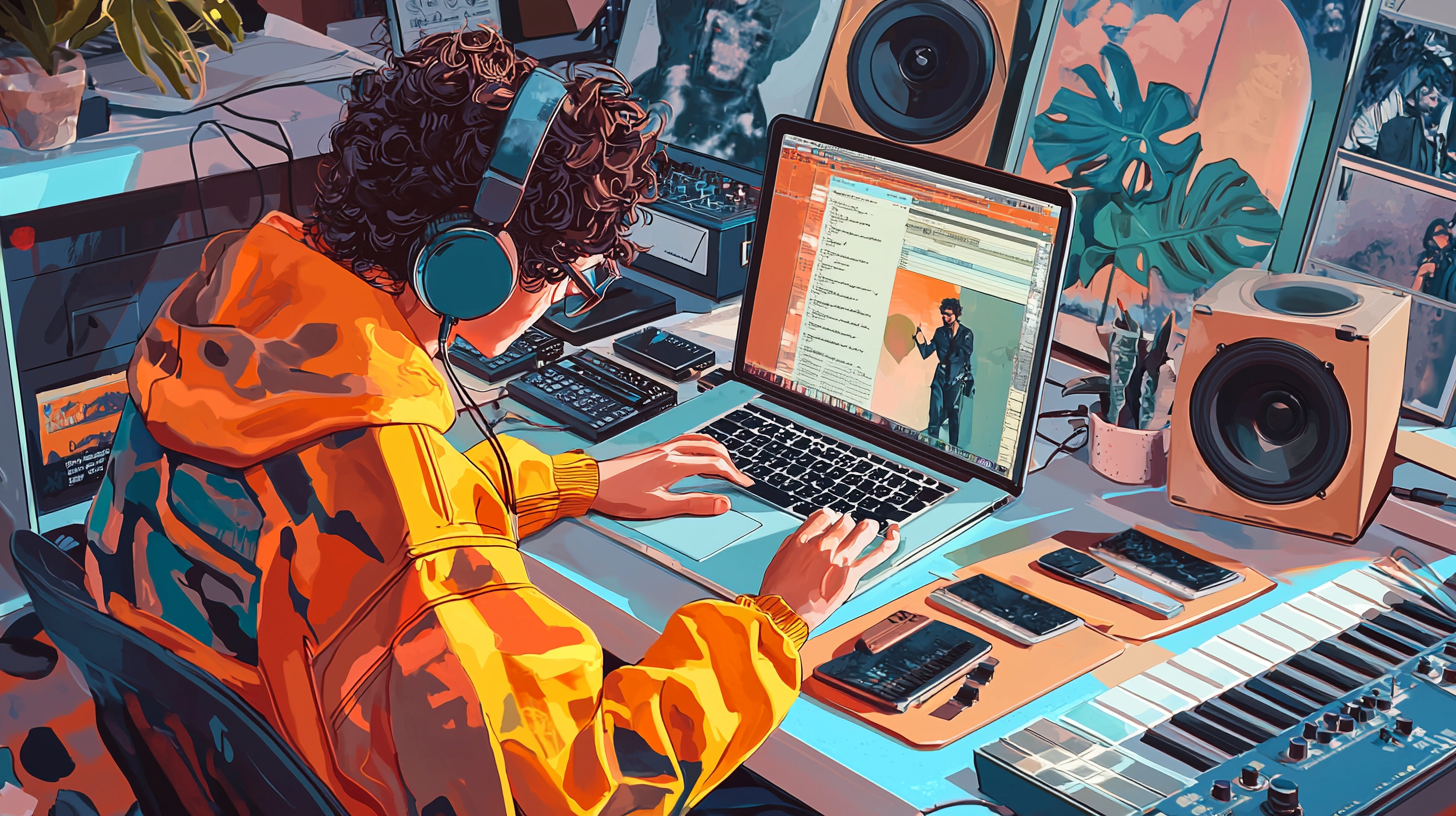How to Get Featured on Music Blogs: The Ultimate Guide for Independent Artists
Getting featured on music blogs is a powerful way to gain exposure, build credibility, and grow your fanbase as an independent artist. Whether you’re just starting or trying to promote a new release, securing coverage on influential blogs can give your career a significant boost. However, with so many artists vying for attention, it’s crucial to have a strategic approach.
In this guide, we’ll explore the best tips and tricks for getting your music featured on music blogs, from crafting the perfect pitch to building relationships with bloggers.
- Research and Target the Right Blogs
The first and most important step to getting featured on music blogs is identifying which blogs are the best fit for your music. Not all blogs cover the same genres, and sending your music to irrelevant outlets wastes time and can hurt your reputation.
Key Strategies for Blog Targeting:
- Genre-Specific Blogs: Focus on blogs that cover your genre of music. Whether you’re an indie rock artist, a hip-hop producer, or an electronic musician, target outlets that regularly feature artists in your genre.
- Local Blogs: If you’re building a local presence, look for blogs that cover your city’s music scene. Regional blogs are often more willing to feature up-and-coming artists.
- Influencer Bloggers: Some smaller blogs are run by influencers or DJs who have a large following on social media or streaming platforms. These can offer targeted exposure.
Pro Tip: Tools like Hype Machine, SubmitHub, or even simple Google searches („top indie music blogs,“ „best hip-hop blogs“) can help you discover relevant music blogs that feature artists in your style. Hype Machine, in particular, aggregates songs from the most popular blogs, helping you pinpoint which blogs have influence in your genre.
- Craft a Professional Electronic Press Kit (EPK)
Your Electronic Press Kit (EPK) is the most critical component of your submission. It should contain everything a blogger needs to know about you, your music, and your brand, and should be easy to navigate. Most bloggers are pressed for time, so the more professional and straightforward your EPK, the better your chances of getting featured.
Essential Elements of an EPK:
- Artist Bio: Write a compelling bio that tells your story and highlights your unique qualities as an artist. Focus on key milestones such as past releases, notable performances, or collaborations.
- High-Quality Photos: Include professional photos that represent your image and music style.
- Press Quotes: If you’ve been featured elsewhere, include a couple of quotes from prior coverage.
- Music Links: Provide easy access to your music via streaming platforms like Spotify, SoundCloud, or Bandcamp. Direct links are preferable over attachments.
- Social Media and Website Links: Make it easy for bloggers to check out your social presence and find more information about you.
- Contact Information: Ensure bloggers can quickly contact you or your representative for further details.
Muibas Tip:
When using Muibas to collaborate on projects, you can showcase your collaborations in your press kit. Bloggers love fresh content, and being able to highlight unique collaborations will make you stand out. Mention how you used Muibas to work with other musicians and release polished tracks faster.
- Write a Personalized Pitch
When reaching out to bloggers, a personalized pitch is crucial. Mass emails are easy to spot and likely to be ignored. Show the blogger that you’ve done your research and that your music is a good fit for their platform.
Tips for Writing a Great Pitch:
- Keep It Short: Your pitch should be concise and to the point. Most bloggers don’t have time to read lengthy emails, so keep your message brief while conveying the most important information.
- Personalize the Introduction: Address the blogger by name and mention a recent article, review, or featured artist that relates to your music. This shows you’ve taken the time to familiarize yourself with their blog.
- Highlight Your Music: Share a link to your latest track, EP, or album along with a brief description of what makes it special. Mention any unique aspects of the music, such as collaborations or a notable theme behind the project.
- Call to Action: Politely ask for a review or feature. Make it clear that you’re happy to provide more information, answer questions, or set up an interview.
Example Pitch Template:
Hi [Blogger Name],
I hope you’re doing well! I recently came across your review of [similar artist] on [blog name], and I thought you might be interested in checking out my latest release, [track/album name]. I believe it would be a great fit for [blog name], as it blends elements of [genre] with influences from [inspiration].
You can listen to the track here: [streaming link].
I’d love to hear your thoughts and would be honored if you’d consider featuring it on your blog. I’m happy to provide any additional information or answer any questions you might have.
Thanks so much for your time!
Best,
[Your Name]
[Your Website/Social Links]
- Leverage Social Proof
If you’ve already gained some momentum in your music career—whether that’s through social media followers, playlist features, or previous blog placements—use that as leverage in your pitch. Social proof can show bloggers that there’s already a buzz around your music, making them more likely to feature you.
Forms of Social Proof to Highlight:
- Previous Blog Coverage: Mention any previous features or interviews you’ve had on other blogs.
- Streaming Numbers: If your music has performed well on streaming platforms, highlight those numbers.
- Social Media Engagement: Show that you have an active, engaged audience on platforms like Instagram, TikTok, or Twitter.
- Collaborations: If you’ve worked with other notable artists or producers, mention those collaborations to boost credibility.
Muibas Tip:
If you’ve collaborated with other musicians on Muibas, use that as part of your social proof. Highlight your collaborations and explain how working with different artists has enhanced your music. Collaborations often draw attention from music blogs as they indicate a versatile, creative artist.
- Follow Submission Guidelines
Each blog has its own submission guidelines, and not following them can immediately disqualify your pitch. Many blogs have detailed instructions on how to submit music—some prefer email, while others use submission platforms like SubmitHub or Groover.
Key Points to Remember:
- Respect the Format: If a blog asks for a specific subject line or file format (e.g., links instead of MP3 attachments), follow their rules to the letter.
- Provide Everything in One Email: Don’t send multiple follow-up emails unless asked. Include your EPK, pitch, and all relevant links in the initial message.
- Stay Professional: Avoid coming across as overly pushy or desperate. Even if you don’t get a response right away, remain courteous and professional in all your communications.
- Build Relationships with Bloggers
Bloggers, like musicians, are part of a community. Building long-term relationships with bloggers can increase your chances of future coverage and even lead to more significant opportunities down the line.
How to Build Relationships:
- Engage with Their Content: Comment on blog posts, share articles on social media, and promote their work to your audience. This shows that you’re genuinely interested in their platform, not just using them for a feature.
- Follow Up Respectfully: If you don’t hear back after your initial pitch, it’s okay to send a polite follow-up email after a week or two. Keep it short and professional.
- Stay in Touch: After being featured, express your gratitude and continue to engage with the blogger’s content. Maintaining a relationship beyond the initial feature increases the likelihood of future support.
- Submit to Music Blog Submission Platforms
In addition to direct pitches, many music blogs accept submissions through platforms like SubmitHub and Groover, which allow you to pay a small fee to guarantee that your music is reviewed.
Key Platforms for Blog Submissions:
- SubmitHub: A platform that allows you to submit your music to bloggers, curators, and influencers. You can choose either free or paid submissions, with the latter guaranteeing a response.
- Groover: Similar to SubmitHub, Groover connects artists with music curators for a fee, ensuring feedback on each submission.
- IndieMono: Another platform that helps indie artists get featured on Spotify playlists, blogs, and more.
Conclusion: How Muibas Can Help You Get Featured
Getting featured on music blogs requires a combination of strategic targeting, professional presentation, and relationship building. By honing your pitch, crafting a compelling EPK, and showcasing your musical achievements, you can increase your chances of landing valuable coverage.
Using Muibas for collaboration can also enhance your chances of getting featured. Highlight your creative process, collaborative efforts, and unique projects when reaching out to bloggers. Not only does this show that you’re an active and versatile artist, but it also gives you fresh content to pitch regularly, keeping you relevant and engaging to the music blogging community.
Ready to boost your music blog features? Start collaborating with top-tier musicians on Muibas.com today and create music that grabs the attention of the most influential blogs.


